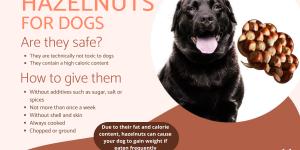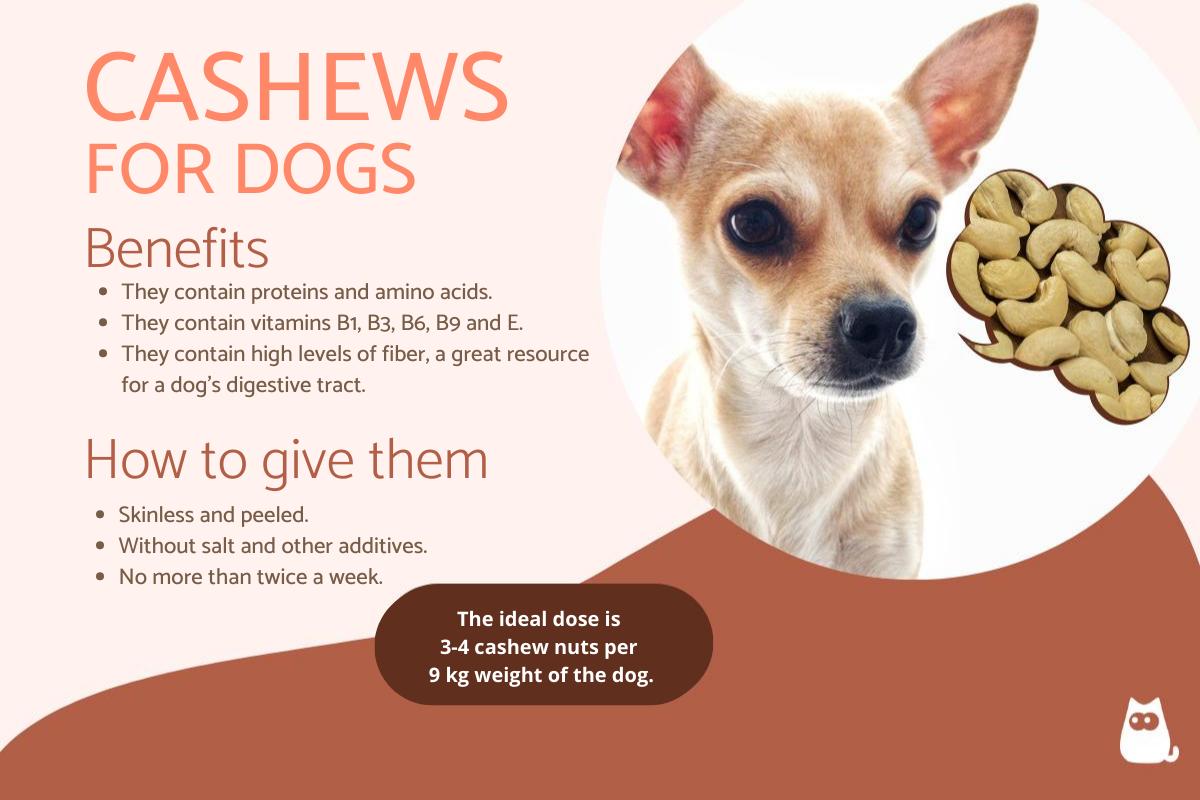Can Dogs Eat Cashews Nuts?



See files for Dogs
Cashews are creamy, protein-rich nuts high in fiber, heart-healthy monounsaturated fats, and immune-boosting nutrients like zinc and magnesium. The health benefits of cashews are well known, but can they benefit our dogs? Like many other healthy foods for humans, cashews are okay for your dog to eat. However, this does not mean that they are necessary for a balanced diet
The following AnimalWised article explains if cashews are safe for dogs and how you can give them to them.
Are cashews good for dogs?
Dogs can eat certain nuts like cashews, but it is certainly not the best food for them. Therefore, we can say that dogs can eat cashew nuts occasionally, but definitely not daily.
It is important to keep in mind that dogs are facultative carnivores, which means that their diet should consist mainly of animal protein and to a lesser extent vegetables, fruits or carbohydrate-rich foods. For this reason, it is sometimes said that they are omnivores due to their adaptability through the domestication process. However, they are still carnivores with the advantage of being able to tolerate other foods as well
Despite their richness in proteins, vitamins and minerals, cashew nuts contain a lot of fat and are very high in calories, so they are not recommended for dogs.
Can dogs eat cashew butter or milk?
Cashew milk and cashew butter have become a staple in many of our diets, providing a dairy-free and vegan-friendly alternative in place of cow's milk and butter. And since dogs can eat cashews, you may be wondering if they can also lick cashew butter or milk. The answer is yes, but in moderation. However, check the ingredients list and make sure there are not too many other additives. Pay particular attention to xylitol, a type of sugar alcohol that is toxic to dogs.
Benefits of cashews for dogs
Cashews are nuts that are very beneficial to health, because although they contain abundant fats, they are mainly monounsaturated or polyunsaturated and less than other nuts such as walnuts or almonds. In fact, these tasty, tropical nuts are a good source of:
- Protein: provides your dog with essential amino acids that contribute to healthy hair and skin, muscle development, and tissue repair.
- Fiber: is a great resource for a dog's digestive tract. Fiber is often fermented into fatty acids by the beneficial bacteria found in your dog's intestines. This fatty acid then helps prevent the overgrowth of bad bacteria and helps the colon recover from injury.
- Magnesium: it helps maintain normal nerve and muscle function, supports a healthy immune system, keeps the heartbeat steady, and helps keep bones strong.
- Copper: essential for maintaining the structures of bones, nerves, blood vessels, hair, and skin in good condition.
- Zinc: plays an important role in many substances in the dog's body, including enzymes, proteins and hormones. Zinc is also important for the functioning of the immune system and the thyroid gland.
- Vitamins (B1, B3, B6, B9 and E): these vitamins have different functions, but in general they improve metabolism and energy, help in the formation of blood cells and nerves, provide healthy skin and hair, prevent heart disease and cancer, and much more.
This dried fruit is also a source of tryptophan, a precursor amino acid for serotonin, a neurotransmitter associated with well-being, serenity, and control of anxiety. Because of all these nutrients, cashews can promote canine health by strengthening their cardiovascular, immune and bone systems and preventing premature cellular aging and anemia.
How many cashews can I give my dog?
The answer depends on the size and weight of the animal. As mentioned earlier, the calorie and fat content of cashews is a good reminder that they should be enjoyed only occasionally.
Veterinarians often recommend that treats should not exceed 10 percent of your dog's daily calorie intake. So if your dog is at a healthy weight, you may want to give him just a few whole cashews to keep the calorie and fat content in check and let your pup enjoy the taste and nutritional value.
This is roughly equivalent to 3-4 cashews per 9 kg of the dog's weight.
You may be interested in this other article, where we discuss whether dogs can eat peanuts.
How to give cashews to my dog?
Cashews should be offered with caution and in moderation. Here are some recommendations on how to give them to your dog:
First, you must offer cashews without any additives and without the shell, as it contains toxic compounds.
You can mix cashews directly into the main food if it is homemade, or offer them separately, which is especially suitable if your dog is trying cashews for the first time.
Dogs should be given raw cashews without salt, additives, or spices.
When you feed your dog cashews for the first time, you should stay close and observe your dog's reaction and possible allergies or sensitivities to cashews. Symptoms of an allergic reaction to cashews include:
- Swelling of the mouth, tongue, or throat.
- Breathing difficulties.
- Vomiting
- Diarrhea
- Itching
Continue reading this other article if you want to learn more about food allergies in dogs and their symptoms.
Side effects of cashews for dogs
Cashews are a major drawback for dogs that are overweight or obese, or prone to be. Their calorie and fat content can exacerbate these problems and increases dogs' risk of pancreatitis, a very painful inflammation of the pancreas that affects dogs' quality of life.
It is also important to note that cashews should not be mixed with other nuts. Special care should be taken with macadamia nuts because they are toxic and contain more oxalic acid than other nuts. This compound irritates the stomach lining and can increase the risk of forming calcium oxalate stones as well as mobility issues, dizziness, paralysis, weakness, tremors, abdominal pain and vomiting.
Finally, do not offer cashews if your dog has ever had an allergic reaction to other nuts or has gastrointestinal issues.

If you want to read similar articles to Can Dogs Eat Cashews Nuts?, we recommend you visit our Homemade diets category.






